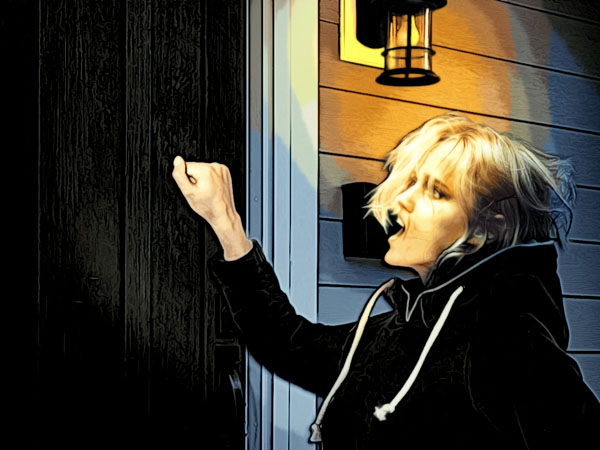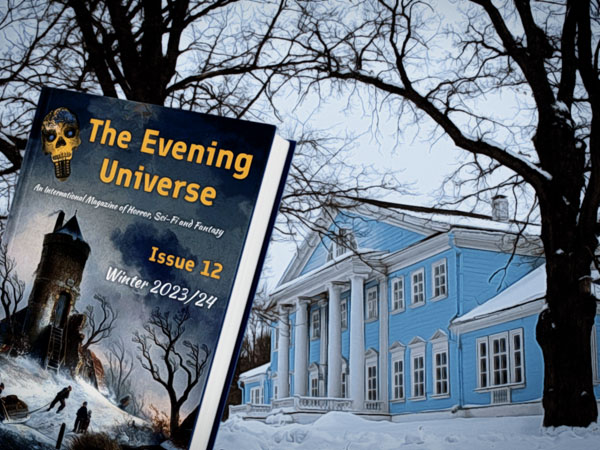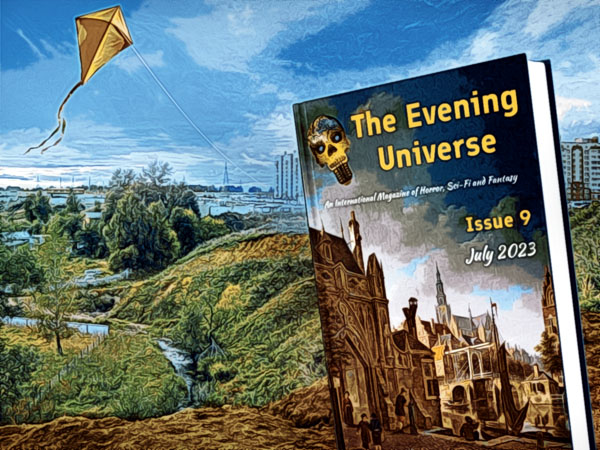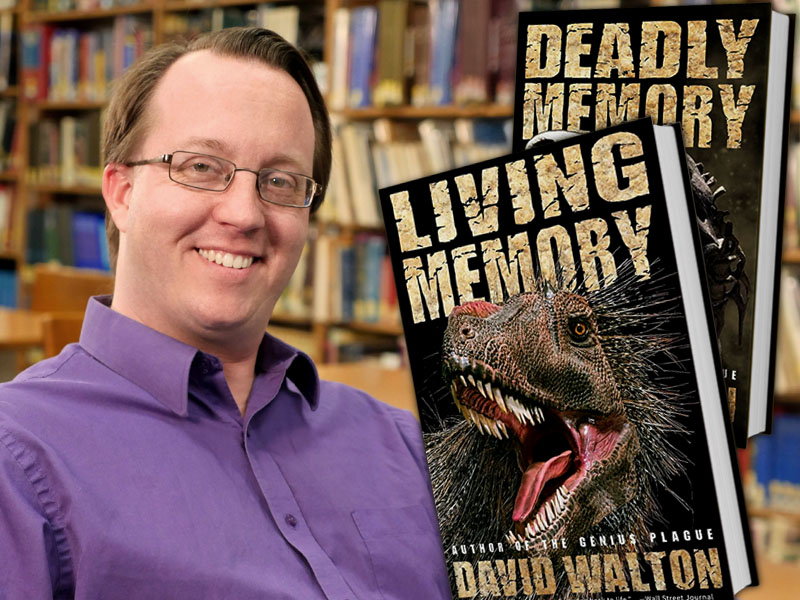
They were already in bed, ready to shut the light and drift toward sleep, when someone knocked on the front door.
It was near midnight, a Friday. Bill and Susan lived alone, were both in their fifties, had no children who might arrive unexpectedly, no friends or relatives who wouldn’t call before visiting. Susan hugged the extra pillow while Bill reached for his glasses, both praying that they’d heard it wrong. Birds crashed into their windows all the time; deer passed through the yard frequently, and even a bear was known to travel the neighborhood. Or perhaps something fell: a garbage can knocked over by a raccoon or a frame on the wall improperly anchored. They traded glances, hoping enough time would pass for them to call it a mistake. Ten, eleven, twelve, Bill counted silently. If he could make it to sixty he could dismiss it as a false alarm. Susan eased her grip on the pillow. Twenty, twenty-one, twenty-two.
Again, there was a bang on the door, and then a woman’s voice, pleading.
“Help me, please…there’s a man, I think he has a knife. Please, let me in…”
Their second-floor bedroom was far enough from the door that the woman had to be screaming for them to hear. She kept banging, frantically now, two fists pounding the aluminum storm door as her voice rose in pitch and volume.
“Please, let me in, he’s going to kill me.”
Bill left the bed, opened the closet door, and grabbed the baseball bat they kept for protection. Susan punched in the Pin to unlock her iPhone, but her fingers couldn’t stop shaking, and she kept tapping the wrong numbers. Bill’s legs were shaking, too, as he peered out the window through the gap between the shade and the glass.
“Do you see anything?”
“A woman,” he said. “She’s alone.”
The banging continued, their cat Linus running into the room and squeezing under the bed.
“Please help me, don’t leave me out here…” the woman’s voice cracked, sobs interspersed with her pleading, “…he’s going to kill me.”
“My God…what do we do?” Bill said.
“Don’t open the door. We can’t—”
“Please … I see him, he’s almost here.”
They lived at the end of a quiet road, their nearest neighbor a football field away. Even if they reached the dispatcher at 911, the police would need five minutes to arrive.
“We can’t leave her out there.”
‘How do we know it’s not them?” Susan said. “You’ve seen the news. What do they always say? Don’t open the door! They prey on people’s decency, but it’s a trap.”
According to the news, the “Bang and Bash” killers had murdered twelve people in the last two months. Their M.O. was simple: a woman knocks on the door of a remote house, begging for help, screaming that a man was stalking her. When the homeowners opened the door to save her, the woman, and her male partner, turned a helpful act into a death sentence. The crime scenes were nightmarish, words written on the walls with the victims’ blood. Evidence showed that the woman too participated in the slaughter. A nanny cam captured the moment she plunged a knife into the stomach of a six-year-old girl. Her feigned vulnerability was the key to their entry, but once inside, she equaled her partner’s brutality.
“Please help me!”
“I can’t listen to this anymore,” Bill said. “We have to do something.”
“No!”
“What if it’s not them?”
“What if it is? Do you want to die, Bill? Do you want to watch them rape me and slit my throat?”
“Please…please! Let me in.” Bang-Bang-Bang. “Please let me in.”
Bill pulled the shade back another inch; the porch light, which they kept on all night as a deterrent, threw light on her trembling figure. She was young, dressed in white sweats and a black hoodie, her blonde hair unkempt as if, like them, she’d been jolted out of bed. No “man with a knife” was visible. The woman turned her head, looking in every direction as she banged and pleaded. Her face showed pure terror.
“Please!”
He’d once read a story, “The Whimper of Whipped Dogs,” about a woman screaming for help while an entire apartment building ignored her cries. The police found her dead in an alley the next morning. It was based on a true story; the woman’s name was Kitty…but he couldn’t think clearly enough to remember her last name. All the New York papers wrote editorials wondering how those people in the building could live with themselves.
He must have moved the shade too far because the woman saw the flash of light from the window and looked up, their eyes meeting.
She knows I’m watching, Bill thought, panicked. She knows.
Susan, ready to lock herself in the bathroom if needed, finally reached the 911 dispatch. “22 Blue Jay Lane, Hurry! She’s at the front door.”
The woman turned to the window, facing Bill with pleading eyes as she pointed toward the driveway.
“He’s here…he sees me…please let me in.”
Bill looked for the man, but it was too dark; all he could see was the woman on the porch, her arms raised toward the second-floor window as if begging for Bill to lift her to safety.
“They’re coming…the police are coming…” Susan said.
“We have to let her in…”
“No! Don’t be so damn stupid all the time. Worry about your wife, not some stranger on a porch who wants to kill us.”
Kitty…Kitty Genovese, that was her name.
“Please!” The woman turned from the window and ran. “You’re leaving me out here to die. Rot in hell!”
Her voice faded as she dashed for the wooded patch behind their house. Bill searched for the stalker but saw only the branches of their dying elm tree, its shadow reflected by the quarter-moon. He let go of the shade, held the baseball bat in both hands, and joined Susan in the bathroom, turning the lock as he pulled the door shut.
Seven minutes later the police arrived, the swirling lights of a cruiser visible through the shade.
“You did the right thing,” the officer advised in a flat voice. “It was probably a prank, but we’ll check it out.”
“Thank you, Officer,” Susan said, standing beside Bill. “It felt so violating…hearing someone at your door in the middle of the night.”
“We…we didn’t know what to do,” Bill said. Perhaps the contempt on the officer’s face was imagined.
The next morning a neighbor found the woman’s body while walking his dog. Her sweatpants and underwear were both missing, and there was evidence of sexual trauma. The stab wounds totaled thirty-seven. She carried no ID, and three days passed before they identified her. Melissa Webster, age 23; her friends called her Missy, which, Bill noticed, nearly rhymed with Kitty.
After the crime lab team completed the usual forensics, Bill and Susan were responsible for the cleanup. The crime scene itself was off their property, but in the sunlight of the next morning they saw Missy’s handprints on the storm door. It was half-glass, half-aluminum. There were minor indentations in the aluminum and a palm print in the center of the glass. They took a photo with Susan’s iPhone and called the police, but the crime lab already had it. Two squirts of Windex and a paper towel cleared the palm print away.
Three days later the “Bang and Bash” killers were apprehended in a motel room near Orlando, Florida. On the night of Missy Webster’s murder they were in Georgia, nearly a thousand miles away. Missy’s killer surrendered himself within a week. A damaged young man, like so many others; he’d become obsessed with her online profile and snapped when she blocked him. He hanged himself in his jail cell; his last words, which no one heard, were “I’m sorry.”
Whenever Bill or Susan spoke of it, the response was empathetic. Who wouldn’t do the same if confronted with such a dreadful dilemma? There was compassion too for the victim, for Missy Webster, with the usual blame game and finger-pointing over social media, permissive parents, inadequate resources for mental health services. Bill’s cousin Eddie turned it into a debate on the 2nd Amendment, stopping short of what he really wanted to say: “That girl would still be alive if she’d knocked on my door. I would have blown that sick bastard away.”
Eventually people stopped asking about it. Bill and Susan installed an alarm system and assured each other that things were “back to normal.” So what if they now slept with the baseball bat in their bed, a Louisville Slugger lying between them like a wall, or that Susan swallowed two new pills every night before shutting the lights? Could anyone blame them?
Of course not, but that didn’t stop Bill from pacing the house every night thinking I should have done something. While Susan, tucked inside an Ambien pill, snored loudly into her pillow upstairs, Bill stared at the front door, waiting for Missy Webster’s ghost to knock. How could she not come back to punish him for abandoning her to a brutal death? Susan didn’t understand. She hadn’t seen the terror in Missy’s eyes. Not even Meryl Streep could have faked that level of fright. He should have opened the door, pulled her inside, and turned the deadbolt. He could have saved her. Twenty-three years old and left to die in a wooded patch between two comfortable middle-class homes, because of him.
I’m sorry, he thought. Whatever you do to haunt me, I deserve it.
Unable to sleep, Bill sat in his recliner, staring at the door, his ears attuned to the constant noise, from the backyard rustling of leaves in the wind to the tired cry of the house’s bones creaking, Bill heard every sound except the one he needed: the knock of Missy’s hand against the locked storm door. He settled into the recliner and waited.
In the morning Susan found him glassy-eyed but still awake, the chair facing the door.
At work the next day he left the office for lunch and drove ten miles to the community college, where he watched the young women rushing through the parking lot heading for their afternoon classes. A few of them resembled Missy Webster, and while Bill couldn’t help them—there was no man with a knife anywhere near—it was a small comfort knowing that these other women were safe. Wedged between the door and the driver’s seat, the baseball bat was always within reach as Bill kept guard. He took special interest in a short blonde who wore the same pink hoodie every day. She was always stumbling, tripping, dropping her books or watching loose papers blow from her bag. Once, he left the car to help her track down the scattered pages, but her expression as he approached was too close to the look of Missy screaming for help on his front porch, and he walked back to his car, ashamed. After two weeks a campus security guard approached him, suggesting he not return without a Student ID.
Bill and Susan slept apart now, Bill spending the night in the recliner, half-asleep, waiting for Missy to knock. Some nights he took an Ambien, desperate to dream. He deserved a nightmare, something so horrific he’d wake up screaming, the man with the knife chasing him across the lawn while Missy watched from the window, laughing, the madman’s knife plunging into Bill’s gut, his cries for help unheeded, the knife striking over and over until Bill woke up in a sweat. But the nightmare never came. When he did sleep, his dreams were peaceful, moments from his daily life without a hint of terror. He’d shake himself awake and stand by the front door, waiting for the knock. But Missy’s ghost never came.
After weeks of declining performance at work, Bill’s manager subtly suggested that he see someone. The company had an excellent Employee Assistance Program, and considering the trauma he’d experienced, it made sense for Bill to talk with a counselor.
“Of course, thank you,” Bill said, listening for knocks on the office door. There was no rule that a ghost couldn’t follow you outside the house, but Missy stayed away from his workplace. Maybe her ghost was too young, he thought, her ability to haunt those who’d betrayed her still undeveloped. During a late-night episode of Friends he saw a commercial for a hearing aid and ordered one by the episode’s end. Maybe her ghost was knocking and he just couldn’t hear it. When the hearing aid arrived, he tore open the box and started wearing it every night, turning the volume to its peak, every sound now amplified; like an owl, he heard it all, even the whirr of a ladybug turning its head.
But Missy’s ghost still didn’t knock.
When Susan too suggested that, for the sake of their marriage and his own well-being, he start “seeing someone,” Bill finally agreed. But it wasn’t a therapist he sought.
According to her website, Allison Boyle was the “World’s Finest Medium,” able to connect with the dead and convey their messages back to the living. Among her listed clients were a popular TV weatherman and a star of a reality show. That he’d never believed in psychics or mediums no longer mattered. He deserved to hear Missy’s condemnation, her judgement of his cowardly soul.
Allison Boyle’s office was a converted sunroom at the back of a suburban ranch, but he was pleased by its no-nonsense décor, its lack of incense and crystals. A card table and two folding chairs were set up in the middle, and Bill sat across from her with tired, desperate eyes, waiting for the medium to channel Missy’s rage. Instead of the flowery scarves and headwrap he expected, Allison Boyle wore jeans and a Roseville High School T-shirt. Her son was on the freshman soccer team; Bill heard him in the driveway kicking a ball against the garage door. She began with some general questions about Bill’s life, to which he gave vague answers and an occasional lie. If she was a fake, she’d get no clues from him. After five minutes she took his hands and closed her eyes. Her soft palms moved in circles over his own, seeking to connect.
“I’m starting to see them,” she said. “A woman…she says she forgives you.”
I don’t deserve forgiveness, he thought.
“I always knew about it, Billy, she says,” Allison told him. “You don’t need to feel guilty. It was only a record, and Mom replaced it at Christmas.”
It was his sister Marcia, who had died of cancer three years earlier. When they were kids, Bill had scratched her copy of Elton John’s Greatest Hits and never admitted it. His heart raced. Allison Boyle was for real. How else could she know about the record?
Soon, through Allison, his mother told him she was proud of him; his father encouraged him to pursue the job in the Finance Department. For thirty minutes a small party of the dearly departed offered their advice and gratitude for his role in their lives, but no matter how great her skill to channel the dead, Allison Boyle heard nothing from Missy Webster, no screaming from the afterlife that Bill should rot in Hell.
“These messages can be difficult to process,” Allison advised at the session’s end. “Go someplace quiet, perhaps take a walk, and give yourself time to think and feel.”
He mumbled a quick “thank you” and walked out the door, her son still pounding the garage with a soccer ball as Bill backed out of the driveway.
On the way home he took a detour to the cemetery where Missy was buried.
Always in Our Hearts, read the etching on her tombstone. Bill stood at her grave, crying, his body shaking. “Please…please…please…”
He remained until sundown, when a groundskeeper returned him to his car.
One morning Susan awoke early and found the living room empty, the recliner facing the door, but no sign of Bill. She called his name but there was no answer, and a chill ran down her skin. They’d grown apart since Missy Webster’s murder, but she still loved him, and worried that he’d done something desperate. She checked the medicine cabinet; thankfully the pills remained in their bottles. When she opened the cellar door she braced for the worst: Bill’s feet dangling in the air, his neck snapped, a rope tied around the beam. But the cellar was empty.
Maybe he’s gone for a drive, she thought, and checked the driveway. She saw the car, parked in its usual spot, and then she saw Bill.
He stood on the porch in his pajama pants and t-shirt, his right hand balled in a fist facing the front door. An early morning frost covered the lawn. Barefoot, Bill shivered, his jaw trembling from the cold as he stared at the door.
“Bill, my God, your feet…”
His toes were blue with frostbite.
“Why won’t she come?” he whispered. “I should hear her knocking…but she never does.”
“Honey, come inside, you’re freezing.” She guided him into the house. “We need to get you warm.”
“Why won’t she knock?” He looked at his wife as if she were a stranger. “I need to rot in Hell. Why won’t she knock?”
After bundling him in blankets on the couch, Susan made the difficult call. Within ten minutes the ambulance arrived and led Bill away, an orderly at both sides, the straitjacket unnecessary as Bill gave no resistance. On the way to the facility they passed the cemetery where Missy Webster’s violated body would eventually turn to dust.
At that moment Bill thought he heard a knock, at last, but it was only the ambulance’s engine backfiring in the cold morning light.











